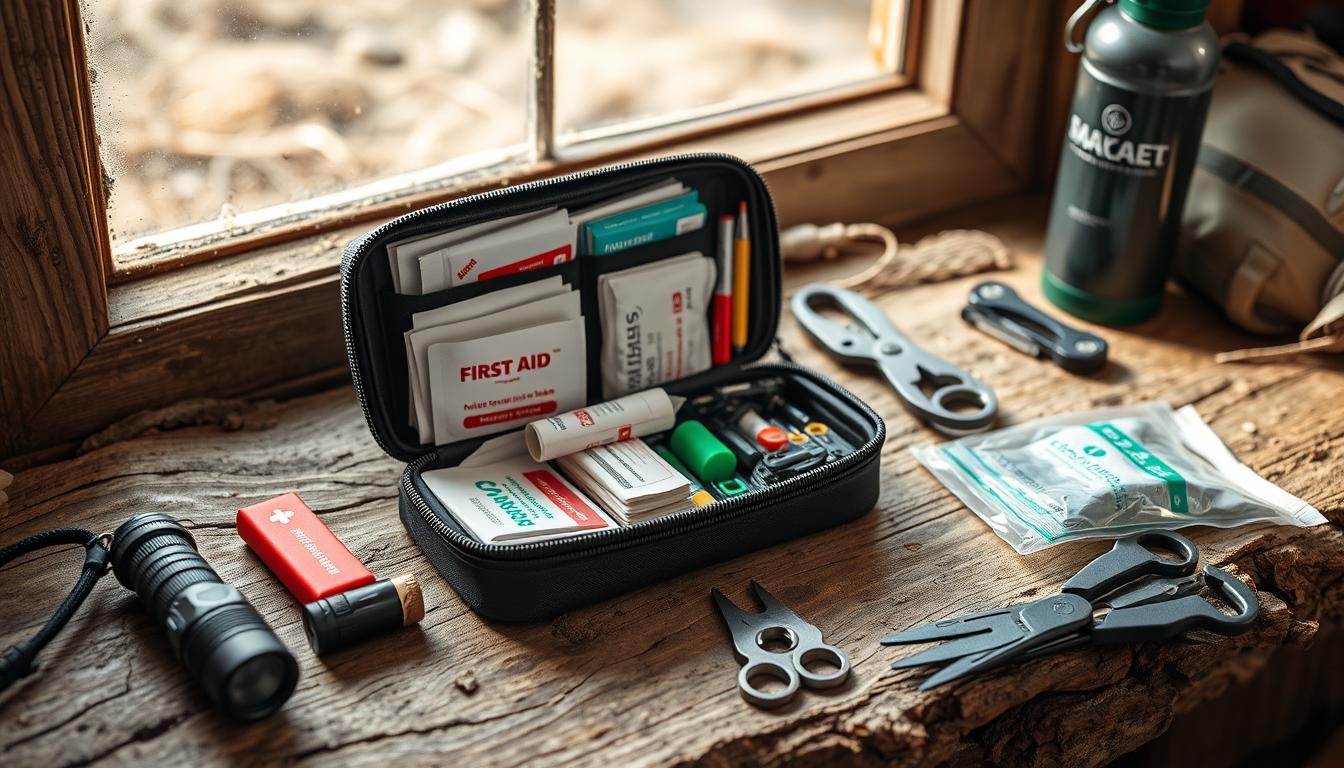When you’re in an emergency or facing a life-threatening situation, staying calm and focused is key. Survival psychology is vital for getting through tough times and coming out strong. This article will cover the main ideas of survival psychology. It will focus on ways to keep you calm and focused when it counts.
Key Takeaways
- Understand the importance of mental preparedness in survival situations.
- Discover the role of mindset in determining your chances of survival.
- Learn stress management techniques to keep your composure under pressure.
- Develop cognitive strategies for maintaining focus and decision-making skills.
- Build resilience and emotional intelligence to overcome fear and anxiety.
Introduction to Survival Psychology
In survival, the mind’s power is huge. Survival psychology looks at how we think and feel in tough situations. It shows that being mentally ready is as important as being physically ready to beat challenges.
Understanding the Importance of Mental Preparedness
When a crisis hits, staying calm and focused is key. Survival psychology teaches us to be mentally ready. This means making good decisions, adapting, and feeling in control. These mental skills boost our chances of surviving and doing well against big challenges.
The Role of Mindset in Survival Situations
Our mindset plays a big part in survival. A positive, flexible, and strong mindset helps us handle survival situations better. On the other hand, a negative mindset can make it harder to make decisions and solve problems. It can even lead to panic.
By working on a mindset that welcomes challenges, thinks creatively, and stays tough, we can beat tough survival situations.
“The greatest weapon against stress is our ability to choose one thought over another.” – William James
Survival psychology looks at how our mind and body work together. It gives us key insights to survive in crises. By knowing how to be mentally ready and the strength of our mindset, we can tackle life’s surprises better.
Survival Psychology: Staying Calm and Focused
When facing survival situations, it’s key to stay calm and focused. This mindset can be the difference between life and death. It helps people think clearly, solve problems well, and make smart choices. This part looks at survival psychology and why staying calm and focused is vital for getting through emergencies.
It’s important to stay calm in a crisis. Panic and fear can make bad decisions that put safety at risk. By staying calm, you can look at the situation clearly, find good solutions, and take the right steps to get past the challenges. Tools like deep breathing, positive thinking, and visualizing a safe outcome can help keep your mind and body calm.
Being able to stay focused is just as crucial. Survival situations can be full of distractions that can take your attention off what’s important. Staying focused helps you keep your priorities straight and solve problems clearly. Using your brain to break down big problems into smaller steps and set goals can keep you on track.
Learning to stay calm and focused can really up your chances of getting through survival situations. These skills improve how you make decisions and solve problems. They also make you feel more in control and resilient when things get tough. Getting good at survival psychology is a key part of being ready for and getting through tough times.
Stress Management Techniques for Survival
In survival situations, managing stress is key. Using stress management techniques helps people stay calm and focused. This makes it easier to make important decisions. Breathing exercises are a great way to calm the mind.
Breathing Exercises for Calming the Mind
Deep, controlled breathing can greatly reduce stress. It slows down the body’s stress response. This lowers heart rate, blood pressure, and stress hormones. Here are some easy breathing exercises for survival:
- The 4-7-8 Breathing technique: Breathe in for 4 seconds, hold for 7, and breathe out for 8. Doing this a few times can make you feel calm.
- The Box Breathing method: Breathe in for 4 seconds, hold for 4, breathe out for 4, and hold again for 4. This helps keep your breath steady and your mind focused.
- The Alternate Nostril Breathing exercise: Close one nostril with your thumb and inhale through the other. Then switch and exhale through the other nostril. This balances your energy and helps you relax.
Adding these breathing techniques to your survival plan can help you manage stress. It keeps your mind calm and clear, making it easier to handle tough situations.
“Breathing is the foundation of life. When you control your breath, you control your mind.” – Anonymous

Cognitive Strategies for Maintaining Focus
Surviving tough situations often means keeping your focus sharp and your mind clear. We’ll look at ways to help you stay focused and calm in survival situations.
Visualization is a strong technique. Imagine yourself getting through the crisis successfully. This helps prepare your mind and body for real challenges. It also boosts your confidence and keeps you calm under stress.
Mental reframing is another good method. Instead of worrying about the bad parts, think about what you can control. This keeps your mind from getting too stressed and helps you feel in charge.
Cognitive chunking is also useful. Break down big tasks into smaller parts. This stops your mind from getting overwhelmed and keeps you focused on your goals.
“The greatest weapon against stress is our ability to choose one thought over another.” – William James
Being mentally strong is just as important as being physically ready. Using these strategies can help you stay focused and resilient, even when things get tough.
Developing Resilience and Mental Toughness
Surviving tough times isn’t just about being ready physically. It also needs strong resilience and mental toughness. We’ll look at how emotional smarts can change the game when things get hard.
Building Emotional Intelligence for Survival
Emotional intelligence, or EQ, is key in survival. It includes knowing yourself, controlling your feelings, and understanding others. These skills help you handle survival challenges and make good decisions when it counts.
Understanding and managing your feelings keeps you calm and focused, even when everything else is falling apart. Being able to understand and connect with others builds strong teams and communication. These are crucial in surviving tough times.
Emotional intelligence also boosts resilience. It lets you recover from tough times and adjust to new situations. This mental strength is vital for overcoming the unexpected challenges in survival.
“The true mark of resilience is not how we endure the initial shock, but how we adapt and grow in the face of adversity.”
By working on emotional intelligence, people can get the mental toughness needed to not just survive, but to do well in tough survival situations. This mix of skills and attitude can be the key to coming out on top.
The Power of Positive Thinking in Survival Scenarios
When you’re in tough survival situations, positive thinking is key. Having an optimistic outlook can help you beat challenges and boost your chances of success. A positive attitude makes you more resilient, helps you solve problems better, and keeps your spirits high.
Positive thinking does more than just make you feel good. It really helps in survival situations. When you focus on finding solutions, you’re better at handling survival challenges. You’ll think more creatively, see new opportunities, and make smart choices that help you survive.
“The greatest weapon against stress is our ability to choose one thought over another.” – William James
Having a positive mindset can also affect those around you. In a group, a positive leader can bring hope and make everyone work together. This teamwork can be crucial in survival situations.
Positive thinking changes how we see things, boosts our resilience, and helps us beat tough obstacles. By being optimistic and resilient, you can survive tough times and come out stronger.

Overcoming Fear and Anxiety in Emergencies
When we face extreme situations, fear and anxiety come naturally. But learning to overcome these emotions can change the game for survival. By using coping mechanisms, people can stay calm and focused. This is key for making important decisions and staying safe.
Coping Mechanisms for Extreme Situations
Visualization is a strong way to overcome anxiety. By imagining themselves getting through the emergency, people can feel more confident and ready. Self-talk, or positive affirmations, is also helpful. It helps manage fear and anxiety.
Controlled breathing exercises are great for calming the mind and easing stress symptoms. Slow, deep breaths activate the parasympathetic nervous system. This system helps with relaxation and gives a sense of control.
- Practice visualization techniques to boost confidence and mental preparedness
- Engage in positive self-talk to manage fear and anxiety
- Utilize controlled breathing exercises to calm the mind and reduce physiological stress
“In the midst of chaos, there is also opportunity.” – Sun Tzu
By using these coping mechanisms, people can better manage their mental and emotional states. This increases their chances of surviving and doing well in extreme situations.
Decision-Making under Pressure
In survival situations, making quick and smart decisions can be a matter of life and death. Decision-making under pressure is key. It needs mental clarity, emotional control, and fast thinking.
When a crisis hits, our minds can get swamped with info, feelings, and the need to act fast. But, by learning decision-making strategies, we can handle these tough times better. We can stay calm and confident.
- Assess the situation objectively: Gather all relevant information, evaluate the risks, and consider multiple possible courses of action.
- Prioritize the most pressing needs: Identify the immediate threats and focus on addressing the most critical issues first.
- Maintain a clear mind: Practice stress-management techniques, such as deep breathing, to stay centered and focused.
- Rely on intuition and experience: Draw upon your instincts and any relevant past experiences to guide your decision-making process.
- Communicate effectively: Clearly convey your decisions and the rationale behind them to those around you, ensuring everyone is on the same page.
“In a crisis, be aware of the danger – but recognize the opportunity.” – John F. Kennedy
Improving these decision-making skills helps us handle survival situations better. It boosts our confidence and resilience. This means we have a better chance of a positive outcome.
Being able to make good decisions when it counts is key to managing a crisis well. By working on this skill, we can protect ourselves and our loved ones, even when things get really tough.
The Importance of Preparedness Training
Learning survival skills and building mental strength is key in emergencies. Training is crucial for this. It includes exercises and simulations to prepare people for survival situations.
Training helps improve your chances of getting through tough times. It also builds confidence and resilience. When emergencies happen, trained individuals stay calm and make smart choices. This increases their survival chances.
Preparedness training also makes you think ahead and plan for dangers. It helps you handle survival situations better. By being prepared, you can act calmly and effectively in emergencies.







